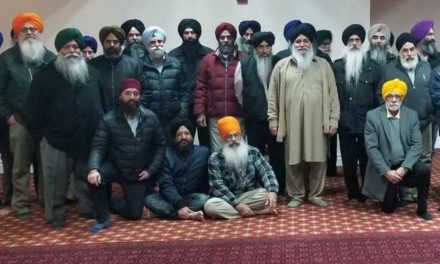Last week I wrote in support of the Network of Sikh Organisations’s (NSO) call for Sikhs to boycott Vaisakhi celebrations at the Prime Minister’s residence in 10 Downing Street. My opinion was echoed by a number of other commentators online, but in the days since few organisations or Sikh personalities have made their stance on the issue public. Whilst my comments were refuted by some individuals – most of whom chose to ignore my call for alternative and more effective political engagement by Sikhs – I feel compelled to build upon the idea I presented last week for the benefit of those who had agreed with me and to instigate what I hope will be a much-needed conversation about the political future of Sikhs in the UK.
The NSO press release calling for a boycott was signed and endorsed by their chairperson, Lord Indarjit Singh, a well-known Sikh with considerable connections and respect within the UK and international Sikh community. Despite his reputation, in last week’s article I had suggested that in order for the boycott to have any impact it would need to be adhered to by all Sikh organisations and personalities which was unlikely to happen. My reason for stating so was that Sikhs in the UK are without a centralised leadership or singular voice which makes it difficult to act in unison. It would appear that my postulation was accurate and there will be a sizeable attendance at Downing Street celebrating Vaisakhi this week. For me that isn’t an issue. Every Sikh is free to act as they see fit within the confines of what the Panth has deemed desirable; in the absence of any real determination of what the Panth wants at this time (due in no small part to the usurpation of the Timeless Fortress at Amritsar where such decisions have traditionally been deliberated and taken en masse) it is not for me to say what any other Sikh can or cannot do. However, what I can control is the direction in which I take my own political engagement following this call for a boycott and encourage others to see things as I do in-keeping with the values of the House of Guru Nanak.
Political engagement in the West has become apathetic in recent decades across most community groups irrespective of age, gender or background. There is a system that has been all but formalised to maintain the status quo under which a strata of society have influence and set the civic agenda whilst the rest of us do not. This is a failing on our part and for Sikhs in particular it should be a matter of shame. From his earliest encounter with political hierarchy and State rule, the founder of the Sikh way of life Guru Nanak espoused an alternative system by which to live. His was a pragmatic and dynamic approach based on the Oneness of all existence, whereby people conform to Universal truths for a more harmonious existence, whilst retaining their own unique personalities. ‘Halemi Raj’ – as it was termed by the Guru himself – is the political doctrine of the Sikhs and was built upon over the next two centuries until the Tenth Guru Nanak brought it’s exposition to culmination.
At every step Guru Nanak was faced with the option of conforming to the prevailing system in order to advance, whether it was in the time of Babur, Bahadur Shah or anywhere in between. There were some Sikhs who would call upon the Guru to meet with the powers that be and placate their demands in order to allow for some route to victory that could then follow. But the Guru’s path was one of azaadi (freedom from constraint of the mind, body and soul) inculcated in recent times by the venerable Sant Jarnail Singh Bhindranwale when he said, “Physical death I do not fear; death of conscience is a sure death.” There is no victory that will follow when we compromise our principles and work within a ‘system’ that our way of life contradicts. This is why I believe that those who think they must socialise with the Prime Minister in order to gain his ear will ultimately be disappointed. Politics is not a formulaic game to play; it is one of subterfuge and intrigue. The intensity with which the Sikh people have been defeated in the last two centuries – first by the British Imperialists and then subsequently by the Brahminical State – is a testament to that and the lasting effect can be emphatically seen by our failure to regain our political astuteness either in the Punjab or in the Disapora.
The call to boycott the Vaisakhi celebrations is long overdue and for me bears no relation to any British involvement in the invasion of Darbar Sahib. I realise that I may be quite alone in this thinking, but there is a much greater notion for removing ourselves from such ‘engagements’. As I alluded to in the previous paragraph, it is for Sikhs to create a better World for everyone and to make change happen according to the principles which we live by. Tokenistic celebrations and photo opportunities do not change our society for the better, and whilst in some cases they do little harm either, at a national and international level they are reflective of our collaboration and corruption within the prevailing system. At the present time, mainstream political parties in the UK are not representative or sympathetic to the principles of our way of life in most areas. The fact that it is a Conservative Party in power under David Cameron is of no consequence as our stance should be the same were it Nick Clegg under the Liberal Democrats or Ed Miliband under the Labour Party. Take foreign policy as an example – irrespective of which party is in control the UK continues to turn a blind eye to modern day slavery practised in Saudi Arabia or the United Arab Emirates, but instead asserts itself mightily in Morocco and Tunisia. On a domestic front, we have seen funding for vital local services cut repeatedly whilst ill-gotten gains in the financial sector have gone wholly unpunished. The disparity between the wealthiest and the most impoverished is now so far apart that a comparison to Malik Bhago and Bhai Lalo seems excessive. Our silence at the closure of local libraries, the introduction of GM foods, the rampant and unchecked growth of people trafficking, these are all issues on which our voices need to be heard and for which this World is looking for leadership. Where have gone the followers of the rider of the blue horse whose very names thundered fear into tyrants and brought voice to the voiceless? Why are we mute in this United Kingdom?
Sikh charitable efforts to remedy peoples circumstances are indeed admirable, but barely touch the surface and discredit Guru Nanak’s philosophy to reform the system and not simply shelter the needy. This boycott is an opportunity for Sikhs to engage with our society and present the universally applicable solutions that Guru Nanak espoused to us as enshrined in the Guru Granth Sahib. That also means that this is an opportunity for most Sikhs to return to the House of Guru Nanak proper and live up to our title of ‘Sikhs’: to learn what those solutions are and to discover what ‘Halemi Raj’ is. My articles this week and last are a call not just to boycott, but to activate. Let us make this a time where we congregate and rethink what it is we are doing as a people. I have no concern with those who wish to go a different way; each person must do what they think is right. The word ‘unity’ is bandied around far too much and shows a lack of understanding of our past where historically the fifth Guru Nanak did not ride out against his eldest brother for going a different way, just as in recent times those Akalis who made deals with the Government were never rejected by the true leaders of the Dharam Yudh morcha. My concern is with those of us who see the folly of dipping samose in chutney at 10 Downing Street whilst Southall and Ilford explode with homelessness, rife drug abuse and a lack of opportunities. We must activate beyond social media, beyond the lengthy right-ing of the World we conduct in langar halls, beyond the heady plans and notions we share in whatsapp groups… we must become the people that we eulogise and make a difference to the society in which we reside.






